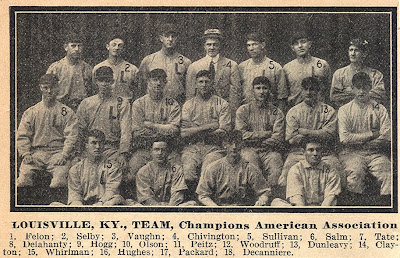Opening Day in the American Association -- 100 Years Ago Today!

The 1909 American Association season opened with a bang around the circuit. Who could have predicted that the Milwaukee Brewers would contend the entire season, battling the Louisville Colonels for the pennant as the league's premier team until the final days of the season. The Colonels, with Jimmie Burke at the helm and playing third-base, came within 4 games of the championship in 1908 with a convincing record of 88-65, finishing second in a close race with Charlie Carr's Indianapolis Indians Under manager Barry McCormick, who played in every game at second-base in 1908, the Brewers completed the season with a record of 71-83 in sixth place. But in the final days of the 1909 campaign, the Suds Men succumbed to the saber-rattling Colonels who took the crown by just 2.5 games!
It was a strange year in the American Association. Pitchers held the reigns, as the league's cumulative batting average was a paltry .237, down from .246 in 1908. League-leading Louisville had one of the worst team batting marks at .233, while the Brewers posted an ugly .232, a mere percentage point lower than their 1908 mark! Such bizarre numbers the Association never saw, and never would see again...in 1910, league hitting climbed to .243, the two lowest marks in league history!
Here's how the 1909 American Association Championship season began on April 14, 1909, one hundred years ago today:
The Toledo Mud Hens opposed the reigning league-champions, the Indianapolis Indians on the Tribe's home grown, West Washington Street Park. Hens' hurler Hi West faced off against Ralph Glaze, but first-baseman/manager Charlie Carr's Indians prevailed, 4-2, as Glaze struck out 8 and held the visitors to 6 hits before one of the largest crowds ever assembled there since its inception as an A.A. ballpark in 1905. Right-fielder Jack Hayden went 3-for-4 on the day with a double and a triple.
At Louisville's Eclipse Park, Jack battled Jack as the Columbus Senators were defeated by the Colonels of Louisville, 6-1, as Jack Halla squared off against the visitors' Jack Taylor. It was Ohio-native Taylor's only outing of the year. Halla allowed but five hits in the easy win in the only errorless opener. New player/manager Henry "Heinie" Peitz was off to a good start; Louisville won their first six games of the season.
Up at Milwaukee's Athletic Park, it was a battle of the "Louis'" as the Brewers took on the St. Paul Saints before a large and raucous crowd on the near-north side. Pitching for the Saints was the Wisconsin-born Native American hurler Louis LaRoy who was matched on the mound by Milwaukee native Louis Manske. The Brew Crew took the opener, 9-5, smashing out 15 hits and putting up a 5-spot in the seventh frame. The Saints made a valiant attempt at a come back, scoring 5 runs of their own in the ninth. The contest featured two home runs, the only long balls on the day: an unlikely shot by St. Paul shortstop Joe Bean and another by Milwaukee second-baseman Barry McCormick who went 3-for-5. McCormick was no longer the Brewer manager, his former role being taken on by J.J. McCloskey. Ill-fated league veteran shortstop Clyde "Rabbit" Robinson, hitting out of the lead-off spot, went 4-for-5 on the day. Robinson's death by blood poisoning in 1915 took him out of the game permanently, but he was active as a professional ballplayer up until the time of his premature demise.
At Kansas City's Association Park under Jimmy Collins (third-baseman/manager) the Minneapolis Millers defeated the Kansas City Blues behind a three-hitter by Fred Olmstead, 2-0. Held to just four hits off the perennial Ducky Swann, the Millers made 'em stick when they scored a pair in the seventh frame of the contest which took 1 hour, 35 minutes, the swiftest event of the day. Four Kansas City errors aided the Millers' cause.
Please write me at pureout@msn.com with any questions or comments.



Comments